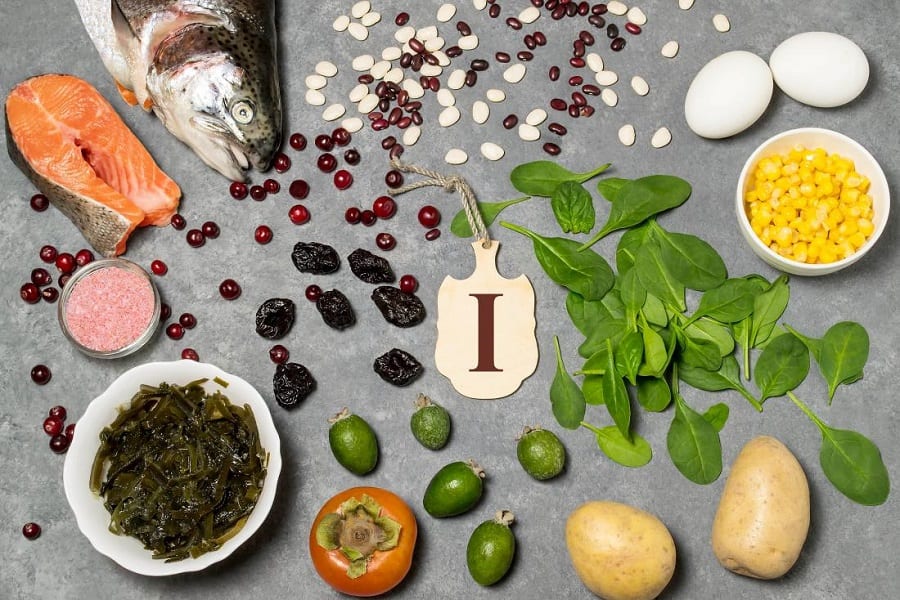Iodine deficiency is a worldwide problem, and about 30% of the global population are highly likely to suffer from iodine deficiency.
You may ask why this is happening because many regions around the different continents do not avail adequate amounts of iodine through their nutrition to the populaces.
Therefore, Iodine insufficiency will carry on being a significant public health problem. Vegans do not eat animal meat and seafood, and most are advised to reduce the amount of salt they use in their food.
Therefore, they do not get the necessary amount of iodine in their bodies. Therefore, as you investigate the different iodine sources and how they work in our bodies, first understand what iodine is.
Contents
What Is Iodine?
Iodine is a mineral and a trace element that is indispensable in our bodies. Our bodies use iodine to produce a hormone called the thyroid. This hormone regulates your metabolic rate, cell production. It also aids in your bones and brain’s evolution process.
It is also essential in pregnant mothers, babies, and youngsters as it helps in their optimal growth, development, and mental functioning. All parents should pay close attention to their kid’s iodine intake to ensure their intellectual development.
Iodine Deficiency
As stated above, iodine deficiency is universal. Therefore, everyone should be keen when engaging in certain diets, especially plant-based ones. If you are suspicious that your iodine levels are not in balance, inspect your body for the following signs:
Goiter
This is a thyroid gland that develops on your neck and is the primary telltale of iodine shortage. You will notice inflammation in the front part of your neck.
Hypothyroidism
Hypothyroidism is a condition that develops when you have low iodine levels in your body for an extended period. You will know that you have hypothyroidism if you notice that you are extra sensitive to cold, weak muscles, and gain extra pounds.
You also become constipated all the time, and your heart beats slowly. In females, their menstruation becomes irregular. Therefore, If you notice any of the above signs, please visit your physician.
Weight gain
Digestion slows down when the levels of iodine in your body are low. Therefore, instead of the food being burned to produce energy, it is deposited as fats in your body. Often, this results in unwarranted weight gain, tiredness, and feeble muscles.
Loss of hair and dry skin
Thyroid hormone regulates the growth of hair follicles and cell regeneration.
Therefore, when you have an iodine deficit, your thyroid hormone’s functioning is disrupted, resulting in flaky skin due to the absence of cell regeneration. And the loss of hair caused by a lack of newly developed hair follicles.
If you are on the vegan regimen, you must understand that while the conditions brought about by insufficient iodine in your body are reversible by taking iodine-rich foods and supplements; some severe conditions cannot be changed.
For instance, pregnant mothers who follow this diet and have low iodine levels will affect their children’s brain development. And in some circumstances, it may result in miscarriages and even the death of a fetus.
In other instances, these children may also be born with congenital defects, such as hearing and speaking difficulties and cerebral disabilities. As a mother, make sure that your regimen comprises of foods rich in iodine and other minerals.
Vegan Food Sources for Iodine
Although a vegan regimen is ideal for your body, it is also destructive. Why?
Because not many countries whose soil is iodine-rich, meaning that they will not get enough iodine in their bodies through the plant-based regimen. This will result in iodine deficit, which can be the onset of a number of ailments.
So vegans should ensure that their regimen comprises of these foods:
Seaweed
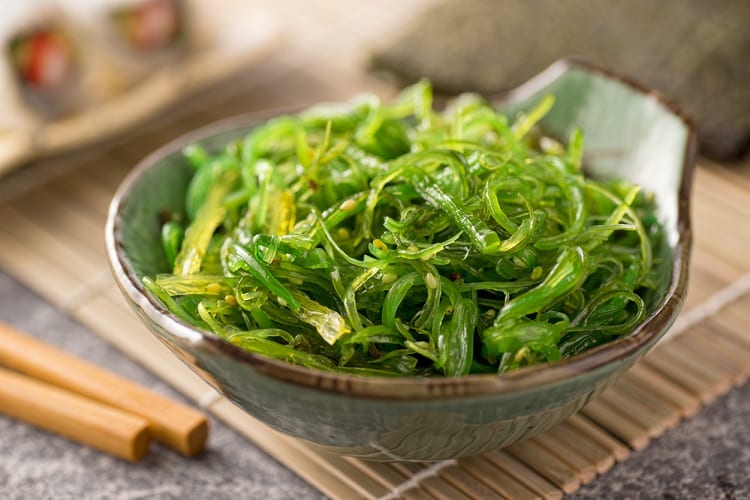
Apart from being calorie deficient, seaweed is also a superb source of vitamins, minerals, and antioxidants.
It is considered one of iodine’s best sources, but the amount found in each seaweed differs from the region where it was grown and the preparation method. Different types of seaweeds are popular among consumer, and they comprise of:
Kombu Kelp
It is brown, and it is dried or ground into a fine powder before it is sold. It is commonly used to prepare by the Japanese to prepare soup stock known as dashi. Compared to other seaweeds, anecdotal evidence reveals that Kombu kelp contains the utmost amount of iodine.
One sheet of dried Kombu kelp holds about 2984 milligrams of iodine, which is almost the same as the recommended daily intake of 2000%.
Wakame
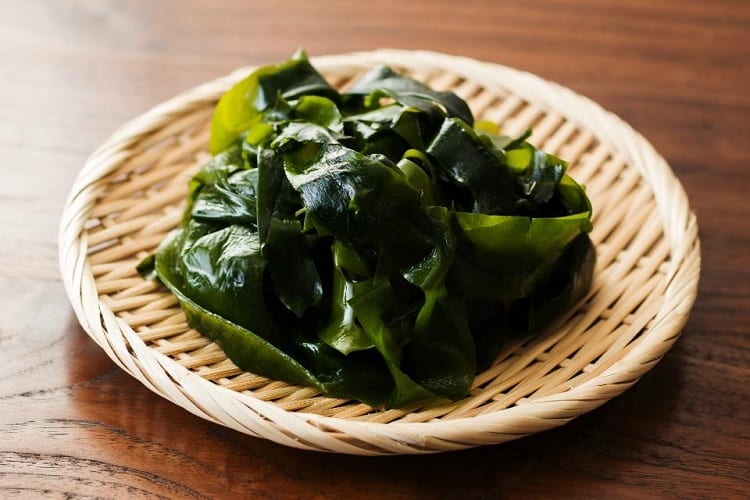
Wakame has a sweet flavor. It is primarily used to make miso soup.
Like kombu kelp, the amount of iodine in this seaweed depends on the place it was grown. You can find it in Australia and New Zealand, and it is believed to have low amounts of iodine. Wakame found in Asia is found to have a slightly higher dose.
The average amount of iodine in this seaweed is 66 mcg per gram, representing 44% of the recommended daily intake.
Nori
It is red in color. And unlike kombu kelp and wakame seaweed, nori has the lowest iodine content. It is used to make sushi rolls. And its iodine content ranges between 16-43 mcg per gram, representing 11-29% of the daily value.
Iodized Salt
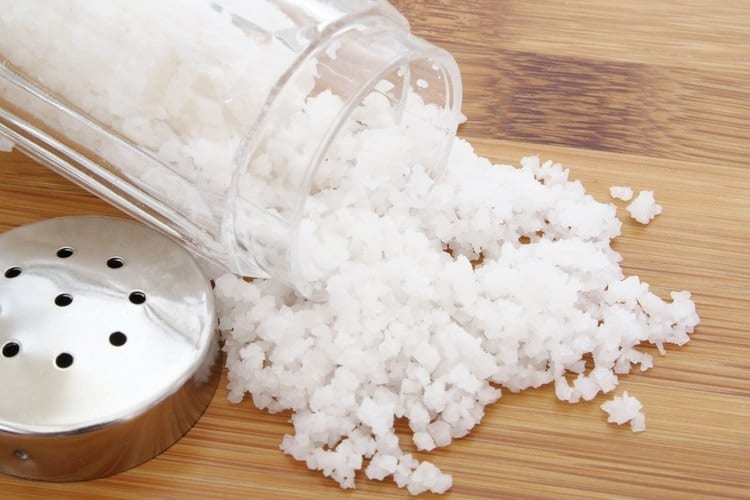
Apart from table salt, Iodized and non-iodized salt will provide you with the required iodine quantity to avoid iodine deficiency.
If you reside in the United States, you can access both iodized and non-iodized salt. A quarter tablespoon of iodized salt is equivalent to 71 mcg of iodine, which is about 47% of the suggested daily value.
Iodine use in the U.S. has skyrocketed in the past few years. This is likely to attract health organizations’ attention by restricting daily salt intake to prevent or treat hypertension.
However, it’s important to note those who are iodine-sensitive are countable, and they amount to around 25% of the entire population of the U.S.
Bread Products
Vegans can also consume bread products as they also have good iodine content. However, it is low than the suggested daily value, so supplement it with iodine-rich food.
Prunes
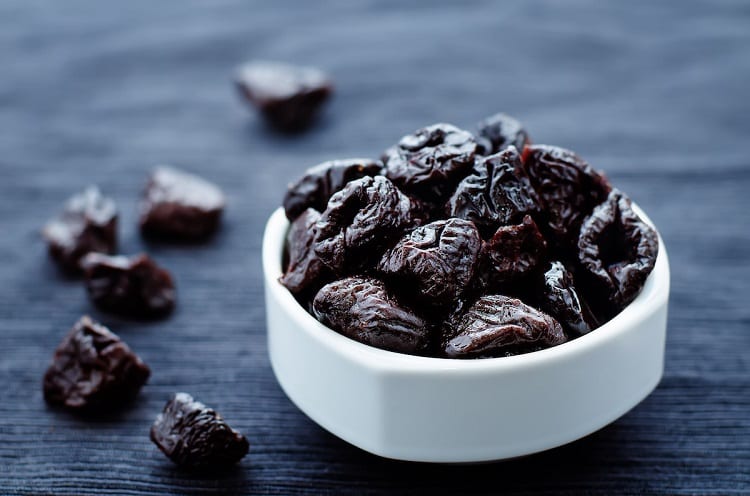
These are dried plums, and they are an ideal source of iodine for vegans. The benefit is that they have high fiber and sorbitol content, which helps to relieve constipation. They also contain vitamins and mineral nutrients, including vitamin k and A, potassium, and iron.
Five dried prunes provide you with 13mcg of iodine, about 9% of the suggested daily value.
The nutrients found in prunes are also crucial for your body as they improve your cardiovascular health, minimize the chances of colon cancer occurrence, and help manage your weight by reducing your appetite.
Lima Beans
They are used to make a dish known as succotash, which mixes maize with lima beans. This dish is common among Native Americans. The beans are a suitable source of fiber, magnesium, and foliate, all of which are great for your body.
Vegan can use lima beans as a source of iodine. However, the total amount of iodine found in lima beans depends on the soil, water, and fertilizers. When these beans are cooked, one cup contains 16 mcg, which is equated to 10% of the suggested daily value.
Dulse
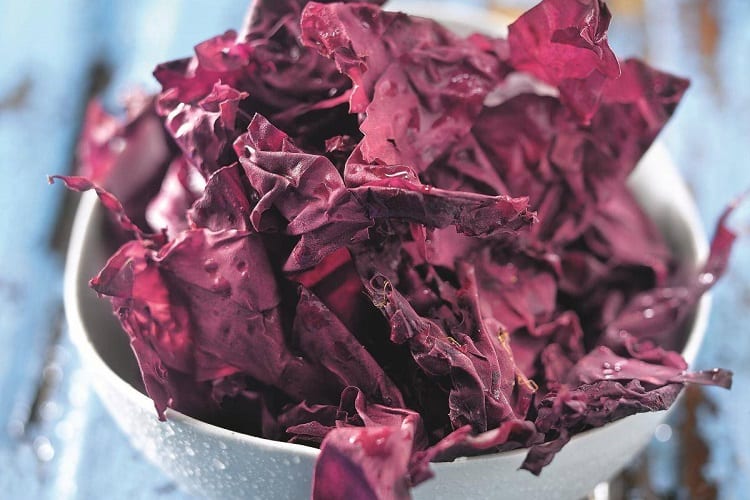
It is a red algae. It comprises of vitamins B-6 and mineral nutrients, such as iron and potassium.
Dulse does not have any fat and cholesterol. It is mainly used to make soda bread. People often use dulse instead of table salt by sprinkling it on soups and salads to add taste.
Cranberries
They are fruits that grow in bushes and are mostly found in the U.S., Chile, and Canada. Cranberries are tiny, and they are rich in Vitamin C and iron minerals. You can find cranberries being sold as dried fruits or in jams.
Other foods that vegans should take to supplement their iodine intake include strawberries, potatoes, green beans, bananas, navy beans, and alaria.
Iodine Supplements for Vegan
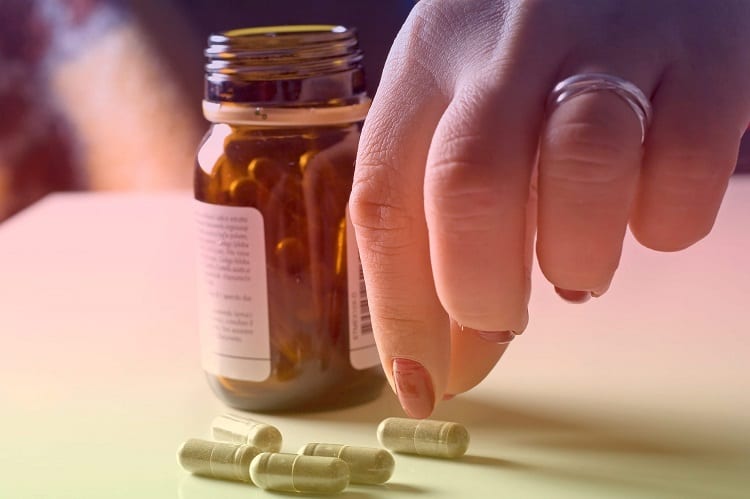
If you do not have access to seaweed or iodized salt, you should try using iodine supplements. Most of these supplements are made using kelp. However, if your food gives you the suggested daily iodine dose, you do not need to take supplements.
It would be best to invest in high-quality vegan sources of iodine supplements as it ensures you get adequate iodine to thrive and avoid diseases caused by iodine deficiency. And at the same time, avoid taking too much iodine to prevent toxicity.
Below are some of the best vegan supplements:
Best Natural Kelp Supplement
It is made from kelp and does not contain additives such as sweeteners, sugar, starch, egg, etc.
Genestra Liquid iodine
User reviews say that this supplement is good a good source of iodine and helps treat thyroid conditions.
It is a drop-based iodine source where users need to use several drops a day to stay in tip-top conditions. It is of high quality and a bit higher on cost.
This supplement is non-GMO. It is unrivaled in terms of quality and provides users with iodine with just a few drops.
It is highly absorbable. It ensures that your thyroid is well regulated and your metabolism is working well, and your energy levels are up. Although it’s a bit expensive, it’s well worth the cost.
Other vegan iodine supplements to watch out for including future kind vegan iodine, Zhou thyroid support complex, yuve natural sea kelp supplement, and thyroid support supplement.
Daily Recommended Iodine Intake
The good thing is that you do not need a lot of iodine in your system to get the thyroid gland to produce the hormones required to keep your body functioning.
However, this may be a problem for people engaging in a diet that restricts them from taking dairy and seafood as they are the primary vegan sources of iodine.
Therefore vegans have to supplement their iodine intake by taking iodine-rich foods or iodine supplements.
According to the National Institutes of Health (NIH), every adult is supposed to take approximately 150 mcg of iodine on a daily basis. And any amount lower than 100 mcg is deemed insufficient.
You should note that some of the foods you take can prevent iodine absorption and actively offset iodine effects on your body. These foods are known as iodine antagonists, and they are mostly found in the vegan diet. They include flaxseeds and cruciferous vegetables.
Infants need about 110 mcg of iodine, which increases slowly to 130 by the time they are one year. And the goes down to 90 mcg till they are eight years. While children between the ages of 9-13 need about 150 mcg.
Importance of Iodine in Our Body
Iodine is essential if you want to maintain your thyroid health. The thyroid gland produces three hormones in charge of controlling your metabolic rate, appetite, heartbeat rate, strength, and breathing.
Below are the reasons why iodine is vital in your body:
Promotes thyroid health
The health of your thyroid depends solely on iodine.
Thyroid gland controls the production and regulation of hormones that control your cardiovascular health and metabolism. Make sure to consume the suggested daily value to avoid disrupting thyroid function as the results could be dire.
Helps in Neurodevelopment during pregnancy
Pregnant mothers need sufficient iodine in their bodies to promote the baby’s proper growth and development in the womb.
Anecdotal evidence shows that iodine is linked with the brain development of the fetus. Insufficient iodine during pregnancy can result in the birth of a child with a low I.Q. and other cerebral disabilities.
Pregnant mothers should take at least 220 mcg per day, which is more by 70 mcg of the normal suggested daily dose for adults. This is because of the baby that is growing in their womb. If your diet does not have sufficient iodine, appeal to your doctor to prescribed iodine supplements.
You should carry on checking your iodine usage even when you are nursing your baby. Nursing mothers are supposed to take 290 mcg; this is because some are transferred to the nursing infant’s milk.
Improves your cognitive function
Your brain controls everything, so make sure that your kid gets the necessary amount of iodine as its benefits extend to the brain.
And to confirm that they are having enough, monitor their diet and talk to your child’s pediatrician. This is because iodine deficiency may inhibit their intellectual ability.
Improves birth weight in infants
Anecdotal evidence shows that a mother has sufficient iodine during the pregnancy; the baby will be born with healthy birth weight.
A study conducted on expectant females with goiters revealed that after taking 400mg of iodine on a daily basis to treat goiter, the infants’ birth weight improved significantly.
However, before using iodine-rich foods or iodine supplements, talk to your physician to avoid consuming too much of it as it could lead to further health issues for you and the baby.
Treating fibrocystic breast disease
This is a non-cancerous breast disease found in females who have reached their reproductive stage. Women suffering from these diseases often detect painful breast tumors.
Although it is said that iodine can treat fibrocystic breast disease, do not try to self-treat, or you can suffer from its side effects. Instead, only use iodine if your physician prescribes it.
Water disinfectant
You can sterilize water using iodine. This is particularly useful in catastrophic situations or if traveling and without access to potable water. Follow the manufacturer’s guidelines when disinfecting water with iodine.
However, people are worried that using iodine to treat drinking water can cause people to take more iodine than the suggested amount as it could lead to iodine toxicity.
Treating infections
Iodine in its liquid or solid form can be used to treat and thwart infections. If you have a cut, put a little iodine on the dent to destroy bacteria and prevent infections. Please do not apply iodine on newborn infants.
Iodine Side Effects
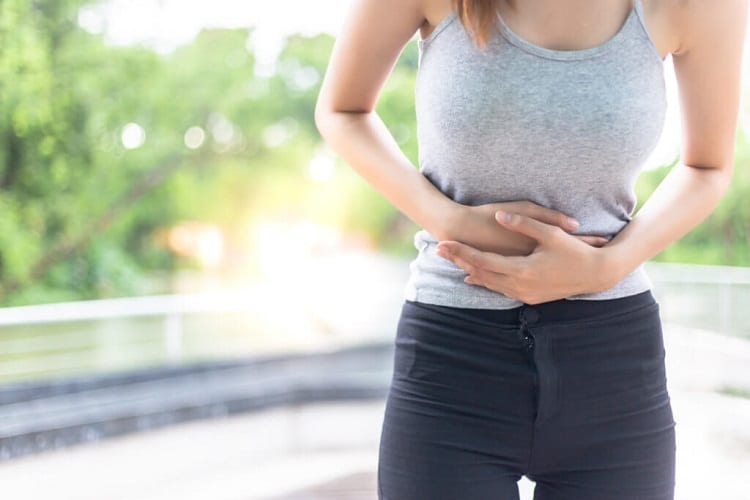
Taking more than the recommended dosage of iodine can result in a few side effects as listed below:
- Nausea
- Fever
- Stomach ache
- Burning feeling in your esophagus and mouth
- Diarrhea
- Vomiting
And, in severe cases, it leads to iodine toxicity.
When to Use Iodine

If you are not sure of your iodine levels, visit your physician. He or she will conduct a urinary test to check the status of iodine in your body. After confirming that they are down, your physician will prescribe iodine supplement that is ideal for you.
It’s important to note that self-medicating may not work if you need a higher iodine dosage. Why?
Because iodine supplements containing more potent formulas are only sold through a prescription from a doctor. For instance, if you have an overactive thyroid gland, you will need stronger iodine supplements.
Final Thoughts
As we’ve seen, iodine is a vital mineral in our bodies. And people who have access to iodine-rich foods are not at risk of having iodine deficiency.
However, if you are on the vegan diet and do not have everyday access to plant-based iodine-rich foods, it would be best if you started taking iodine supplements to minimize developing diseases caused by insufficient iodine.
But it is advisable to visit your doctor for a consultation about your iodine needs.

